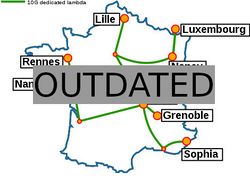Grid5000:Home
|
Grid'5000 is a large-scale and versatile testbed for experiment-driven research in all areas of computer science, with a focus on parallel and distributed computing including Cloud, HPC and Big Data. Key features:
Older documents:
|
Random pick of publications
Five random publications that benefited from Grid'5000 (at least 2937 overall):
- Chih-Kai Huang, Guillaume Pierre. UnBound: Multi-Tenancy Management in Scalable Fog Meta-Federations. UCC 2024 - 17th IEEE/ACM International Conference on Utility and Cloud Computing, Dec 2024, Sharjah, United Arab Emirates. pp.1-11. hal-04760398 view on HAL pdf
- Jérémie Rodez, Patricia Stolf, Thierry Monteil. Placement of Distributed Machine Learning Services for AI- and Smart Grid-Enabled IoT Platforms. 2026. hal-05279358 view on HAL pdf
- Hugo Thomas, Guillaume Gravier, Pascale Sébillot. One-shot relation retrieval in news archives: adapting N-way K-shot relation classification for efficient knowledge extraction. KES 2024 - 28th International Conference on Knowledge-Based and Intelligent Information & Engineering Systems, Sep 2024, Seville, Spain. pp.1060-1069. hal-04708239 view on HAL pdf
- Guillaume Schreiner, Pierre Neyron. SLICES-FR : l’infrastructure de recherche nationale pour l’expérimentation Cloud et Réseaux du futur. JRES 2024 - Journées réseaux de l'enseignement et de la recherche, Renater, Dec 2024, Rennes, France. pp.1-15. hal-04893845 view on HAL pdf
- Juliette Luiselli, Jonathan Rouzaud-Cornabas, Nicolas Lartillot, Guillaume Beslon. Genome Streamlining: Effect of Mutation Rate and Population Size on Genome Size Reduction. Genome Biology and Evolution, 2024, 16, 10.1093/gbe/evae250. hal-04905734 view on HAL pdf
Latest news
Failed to load RSS feed from https://www.grid5000.fr/mediawiki/index.php?title=News&action=feed&feed=atom: Error parsing XML for RSS
Grid'5000 sites
Current funding
As from June 2008, Inria is the main contributor to Grid'5000 funding.
INRIA |
CNRS |
UniversitiesUniversité Grenoble Alpes, Grenoble INP |
Regional councilsAquitaine |


